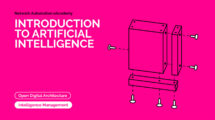The Digital Decade is a European Union (EU) initiative designed to accelerate the digital transformation of Europe up until 2030. The goal of such an initiative is to ensure that all European citizens have access to secure, high-quality digital infrastructure and services, whilst also protecting their rights in the online space.
Internet governance takes different forms across the globe; in the United States an internet friendly to business and corporate competition takes precedent, in China the emphasis is on state sovereignty, and in Europe the European Commission (EC) wishes our internet to be people centered. But why is this important to our community?
On the face of it, there will be one immediate impact. One of the key goals of the Digital Decade is to ensure that all Europeans have access to high-speed, secure digital infrastructure. This means that NRENs will need to invest in upgrading their networks and services to meet the increasing demand for bandwidth and connectivity as an overall societal trend. The amount of data being both produced and consumed by individual R&E users and institutions will increase due to the continent as a whole becoming increasingly digitised.
A second impact will be an increase in demand for certain technologies – applications will need to be developed that aid researchers and educators. This could include tools available for data analytics and visualisation, cloud-based computing, more effective trust & identity/AAI management and more resilient security services.
A more nuanced yet equally important aspect of the Digital Decade is the focus on improving digital skills and education. To ensure that all Europeans have the digital skills they need to participate fully in the Digital Single Market is by no means a small task, especially when you consider that 54% of the European population only has basic digital literacy (though population is not the same as workforce). NRENs could work closely with institutions in order to develop and deliver new digital education programs and training courses, to cover this demand from an R&E perspective.
But what can NRENs do now to ready themselves for such developments? Well, one immediate benefit would be to position themselves within the cooperation cycle of the Digital Decade policy programme. This monitoring, reporting and governance mechanism will produce a yearly ‘State of the Digital Decade’ report, which reports back on the recommended actions to Member States and utilises the Digital Economy and Society Index (DESI) to measure progress via Key Performance Indicators (KPIs). So, aligning NREN work to the DESI index would immediately bear fruit.
An even more advantageous course of action would be for respective NRENs to be listed in each of the EU-27 national roadmaps. The national roadmaps are set to be revised and consulted within the cooperation cycle every two years, but at the moment, national ministries are drafting their recommendations. Speaking now to ministerial contacts regarding this topic would therefore be mutually beneficial for both sides. For those NRENs outside of the EU-27, the Horizon Europe Widening work programme also provides ample opportunities for digital skills training in the wider European Research Area.
To conclude, within the tangled and often confusing world of EU policy making, the Digital Decade is a relatively simpler and more straightforward programme to interact with. In doing so, NRENs and GÉANT can remain relevant and eligible for future benefits and opportunities that stem from the programme up to 2030 and beyond.
This article is featured on CONNECT43! Read or download the full magazine here







